 Petzlover
Petzlover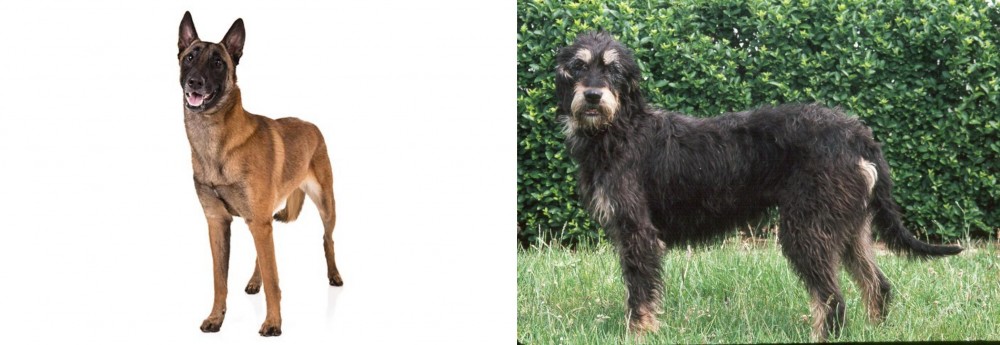 Belgian Shepherd Dog (Malinois) is originated from Belgium but Griffon Nivernais is originated from France. Both Belgian Shepherd Dog (Malinois) and Griffon Nivernais are having almost same height. Belgian Shepherd Dog (Malinois) may weigh 9 kg / 20 pounds more than Griffon Nivernais. Both Belgian Shepherd Dog (Malinois) and Griffon Nivernais has same life span. Belgian Shepherd Dog (Malinois) may have more litter size than Griffon Nivernais. Belgian Shepherd Dog (Malinois) requires Low Maintenance. But Griffon Nivernais requires Moderate Maintenance
Belgian Shepherd Dog (Malinois) is originated from Belgium but Griffon Nivernais is originated from France. Both Belgian Shepherd Dog (Malinois) and Griffon Nivernais are having almost same height. Belgian Shepherd Dog (Malinois) may weigh 9 kg / 20 pounds more than Griffon Nivernais. Both Belgian Shepherd Dog (Malinois) and Griffon Nivernais has same life span. Belgian Shepherd Dog (Malinois) may have more litter size than Griffon Nivernais. Belgian Shepherd Dog (Malinois) requires Low Maintenance. But Griffon Nivernais requires Moderate Maintenance
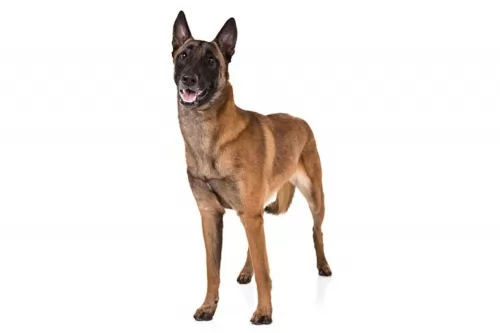 The Belgian Malinois is one of 4 Belgian Shepherd varieties. The dogs were developed- and hail from Belguim. The Malinois has a short, fawn colored coat. The American Kennel Club recognizes that the Malinois is a separate breed from the other 3 varieties. It was in 1892 that Professor Reul wrote the first Belgian Shepherd Dog standard, recognizing 3 varieties – dogs with short coats, dogs with long coats and dogs with rough coats.
The Belgian Malinois is one of 4 Belgian Shepherd varieties. The dogs were developed- and hail from Belguim. The Malinois has a short, fawn colored coat. The American Kennel Club recognizes that the Malinois is a separate breed from the other 3 varieties. It was in 1892 that Professor Reul wrote the first Belgian Shepherd Dog standard, recognizing 3 varieties – dogs with short coats, dogs with long coats and dogs with rough coats.
Today's Malinois goes back to a breeding pair owned by Adrien Janssens. It was in 1885 that he bought a fawn, rough-haired dog, breeding the dog with a short-haired dog named Lise de Laeken. After other breedings, the two dogs were recognized as ancestors of the modern Belgian Shepherd Dogs.
The city of Malines formed a club for the promotion of these fawn short hairs and the name Malinois became synonymous with them. In March 1992, the American Belgian Malinois Club received AKC parent club status.
 The Griffon Nivernais is a working breed dog originating in France and used as a hunting dog because of his exceptional scent skills and his alertness with hunting.
The Griffon Nivernais is a working breed dog originating in France and used as a hunting dog because of his exceptional scent skills and his alertness with hunting.
The idea was to develop a dog that looked much like the hunting dogs of the Middle Ages. French noblemen kept these dogs but the breed disappeared somewhat after the French Revolution, being restored again in 1925.
The restoration of the breed was done based on the Grand Griffon Vendeen but other breeds were also used such as the Otter- and Foxhounds. The breed has yet to receive official recognition by the AKC but it is recognized by both the FCI and the UKC.
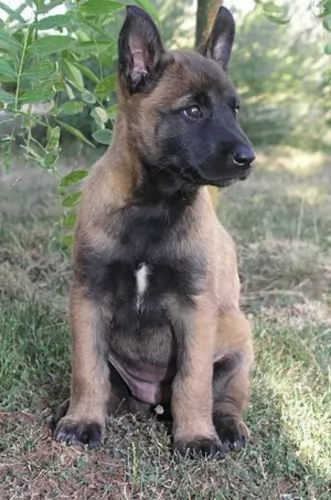 The Malinois is a medium-size Belgian shepherd dog. People sometimes mistake them for the German Shepherd as they are fairly similar to look at. The Malinois however is a smaller, lighter boned dog with naturally upright ears and a black-masked face. He is shorthaired and fawn-colored with black tips on the hairs, although other colors are brown or red too. He is an intelligent and active dog, always having been used for herding-, police- and rescue work.
The Malinois is a medium-size Belgian shepherd dog. People sometimes mistake them for the German Shepherd as they are fairly similar to look at. The Malinois however is a smaller, lighter boned dog with naturally upright ears and a black-masked face. He is shorthaired and fawn-colored with black tips on the hairs, although other colors are brown or red too. He is an intelligent and active dog, always having been used for herding-, police- and rescue work.
You’ll find the Malinois somewhat unpredictable as some are friendly and confident while other can be shy and withdrawn around strangers. This is a dog who loves to be around his human family, but to bring out the best in him, training and socialization classes will be necessary. Well-socialized Malinois are always good with children and other pets, more so if they’ve been raised with them.
 As a medium sized dog, the Griffon Nivernais stands at 55 to 62cm in height and weighs between about 22 and 25kg.
As a medium sized dog, the Griffon Nivernais stands at 55 to 62cm in height and weighs between about 22 and 25kg.
He is recognized easily by his distinctive rough or shaggy coat which is a grey with fawn around the muzzle and legs. Other colors can be black and fawn. Sometimes this blend of colors gives him a grizzled look in appearance.
He is also noted for the hairy eyebrows, a beard and mustache. He has dark brown eyes, black nose, long floppy ears and a tail that is held upright and with a slight curve. He is a muscular dog with a deep chest and a slight arch in the back.
Stubborn, courageous and independent, the Griffon Nivernais is a hunting dog with amazing scenting abilities. He is a dog used to working in a pack with other dogs so he tolerates other dogs well. He is a friendly dog, getting on well with children as well.
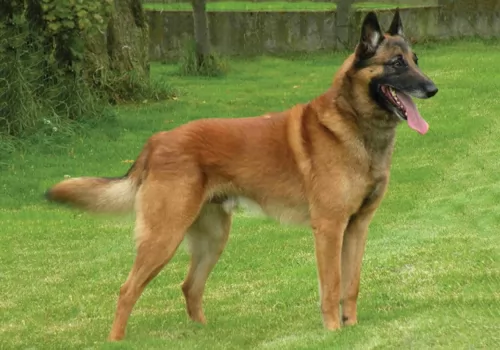 The Belgian Malinois makes a wonderful guard dog and he works hard to ensure that his human family, whom he adores, are well protected under his watch. They’re such intelligent dogs too that you may feel inclined to pass over some of your chores to him.
The Belgian Malinois makes a wonderful guard dog and he works hard to ensure that his human family, whom he adores, are well protected under his watch. They’re such intelligent dogs too that you may feel inclined to pass over some of your chores to him.
He responds well to training, and to get the best from this breed, start with training and socialization as soon as you bring your puppy home.
Socialization is excellent as it introduces your puppy to different people, animals as well as situations.
He is an adaptable dog and can live in an apartment if he is well exercised. He can be your devoted and loyal friend for a good number of years but you will have to do your part in providing him with the best care possible.
 Your Griffon Nivernais is a sociable, stubborn, independent dog who loves to be around his human family members.
Your Griffon Nivernais is a sociable, stubborn, independent dog who loves to be around his human family members.
Socialization and training will do him good and round him off, making him obedient and responsive to your commands. He isn't an aggressive dog, but is even tempered and confident.
Exercise him well, feed him quality food, give him a nice warm, dry place to sleep, just like any other family member of yours, and you'll be rewarded with the companionship of a faithful, loving friend.
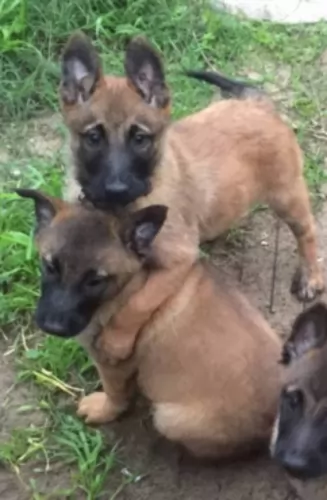 Belgian Malinois are generally healthy dogs. However every dog, regardless of breed, can pick up illnesses, and it is always wise to be aware of some of the diseases your Malinois might face.
Belgian Malinois are generally healthy dogs. However every dog, regardless of breed, can pick up illnesses, and it is always wise to be aware of some of the diseases your Malinois might face.
An inherited condition where the thigh bone doesn't fit properly into the hip joint. As the dog ages, arthritis can develop.
A degenerative eye disorder that can lead to blindness.
Brush his teeth at least 2 or 3 times a week to remove tartar build-up. Too much plague leads to inflamed gums, bad breath, pus inside the mouth and even loss of teeth.
 The typical lifespan for your Griffon Nivernais is 10 to 14 years. Even though you're highly unlikely to spend much time with him at the vet, there are one or two common dog illnesses worth knowing about -
The typical lifespan for your Griffon Nivernais is 10 to 14 years. Even though you're highly unlikely to spend much time with him at the vet, there are one or two common dog illnesses worth knowing about -
It is the fate of many dogs with floppy ears that they are prone to developing ear infections. You may notice him shaking his head canine, his ears may be red and there could even be a discharge.Get him to the vet as ear infections can be promptly treated with a course of medication.
Remember to have your Griffon Nivernais puppy vaccinated at 6 weeks of age. Puppies are vulnerable to horrible diseases which can sap the very life from them. These diseases are distemper, canine hepatitis, parvovirus as well as rabies. The puppy’s first vaccinations should be at 6 weeks of age followed by a second vaccination 2 to 4 weeks later.
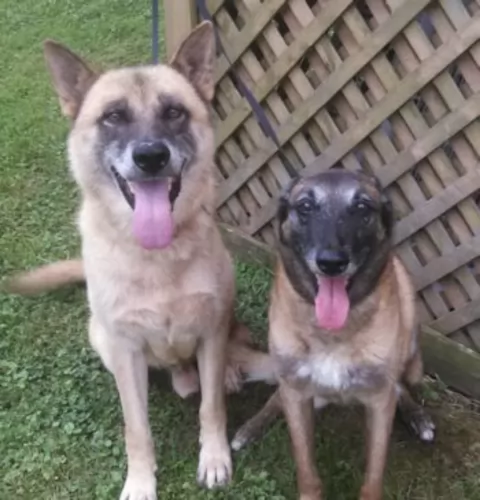 Because the Malinois is a constant shedder, with a couple of heavy shedding periods during the year, you’ll need to be conscientious with his grooming and brush him at least twice a week to get rid of loose hairs and to give his thick coat a glossy, healthy look to it.
Because the Malinois is a constant shedder, with a couple of heavy shedding periods during the year, you’ll need to be conscientious with his grooming and brush him at least twice a week to get rid of loose hairs and to give his thick coat a glossy, healthy look to it.
Because of their high energy, Malinois aren’t recommended for couch-potato type owners. It will be cruel to buy such a dog and to leave him to waste away with boredom and frustration in your back yard. He’ll want lots of rough and tumble, ball games, runs in the park or in the country and long walks.
Belgian Shepherd Malinois puppies are vulnerable when they’re tiny, and it would be wise to speak to your vet about superb nutrition to build up a puppy’s immune system.
An excellent way to ensure the health of your growing Malinois is to give him a home prepared meals along with commercially manufactured food recommended by your vet. You can’t just put a bowl of commercially manufactured dog food in front of him day after day month after month.
Apart from what your vet recommends, give him some brown rice, some cooked vegetables and some raw meat. Raw meat will ensure he can fight of skin infections. The age of the dog, emotional state and environmental influences can all play a role in skin diseases with dogs, but by ensuring some raw meat in his diet, the immune system is strengthened and skin disorders are eliminated. Always ensure a steady supply of fresh water.
 This breed needs to be walked daily, and he needs a large space to run and play. Take him on walks, to the park, or give him a good game with ropes and balls.
This breed needs to be walked daily, and he needs a large space to run and play. Take him on walks, to the park, or give him a good game with ropes and balls.
In spite of his long, shaggy coat, the Griffon Nevernais doesn't need any special grooming and his shaggy coat will require brushing twice a week to remove loose hairs. When you brush him, you can also check for fleas and ticks.You get special flea combs for this. You can speak to your vet about recommendations too.
Because his coat is of a harsh texture it doesn't tangle or matt. Bathing will only be necessary when he becomes super dirty as too much bathing removes natural oils. He will need to have his nails trimmed if they don't wear down naturally, and he will also need to have his ears cleaned to keep them free of wax and dirt and to prevent ear infections.
Brush his teeth 2 or 3 times a week will also help towards preventing dental disease.
He is a high energy dog so he will need to get top quality food. You can feed him the best commercially manufactured food but its to his advantage to include some home-made food too such as cooked chicken, brown rice and vegetables. He'll also need some raw meat from time to time and a constant supply of fresh, cool water.